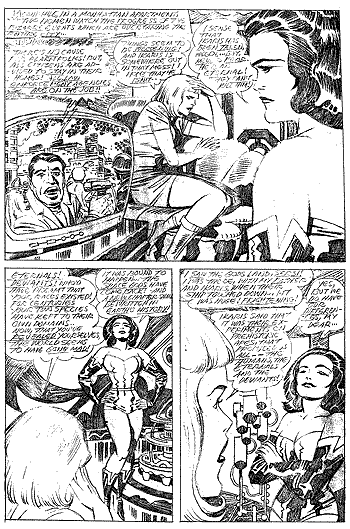|
|
A Monologue On Dialogueby and © Robert L. Bryant Jr.From Jack Kirby Collector #19 Uninked pencils to Eternals #4, page 8. Note how Jack emphasized mostly verbs. Eternals © Marvel Characters, Inc. Art © Jack Kirby. After the King left his '60s kingdom for an unhappy fiefdom at DC, the fans talked, and one of the things they said was: "Kirby can't write." What they meant was: Kirby can't write dialogue; not like Stan the Man, the babbling brook of Marvel, the writer whose "natural" dialogue for Kirby's galactic plots helped reinvent comics. In fact, Jack Kirby's dialogue was as distinctive as Stan Lee's - but like everything else, it reflects the basic schism between Marvel's top writer and its best artist. It's a convention of comics writing that you have to underscore/ emphasize in bold lettering certain parts of a sentence - maybe to help lead the reader's eye through the dialogue and captions, maybe just to set up a writer's rhythm of louder and softer words. Lee turned that convention into a formula that was simultaneously as loose as bell bottoms and as rigid as the chemistry of Coca-Cola. Lee's "natural" dialogue emphasized nouns - it could have been anything, any component of the sentence, but Lee whipped his nouns until they bled. Lee loved words that were solid, visible, concrete, tangible - words you could pose for a picture. Look at the classic FF #50 (1966), the climax of the Galactus trilogy. As Reed Richards checkmates Marvel's most powerful entity and saves the trembling Earth, as Kirby's art crackles off the page with cosmic action, Lee's dialogue (admittedly some of his best) dwells on the stolid nouns and pronouns:
We know that Lee's dialogue often grated on Kirby. Words frequently didn't match what was in Kirby's mind when the scenes popped from his head onto the page. Maybe one of the reasons was a basic psychological mismatch between the two men's thinking and writing styles: When Kirby began writing his own dialogue, first at DC and then after his unhappy return to Marvel, he largely emphasized verbs. Even in Kirby's quietest scenes of the 1970s, his choice of emphasis in dialogue stresses words that run, jump, crash, explode, do things - like his images, they can't sit still. Take this reflective exchange from Mister Miracle #6 (1972). The art is simply head shots, but look at the way Kirby gooses the verbs until they notch up the tension level of the sentences:
This style isn't heresy. But to a generation breast-fed on Lee's noble nouns, Kirby's muscle verbs might have tasted weird, oddball. Many readers who griped about Kirby's "writing" were in fact hung up on his style of loud/soft emphasis in dialogue - a style 180 degrees removed from Lee's. The formula was different. As an experiment, consider these lines from Michael Crichton's novel Jurassic Park. I use it here mainly because it's so Kirbyesque in scope and theme. Here's how it would have been dialogued by Lee - say in 1967, for a splash page of Reed Richards lecturing Ben Grimm about a herd of cloned allosaurs coming right at them:
And here's how Kirby would have done it, say in 1971, for a scene with Mark Moonrider dissing Darkseid's plans for universal domination:
Hear the ring in your mind's ear? That's the Kirby flavor. Lee punched up the object being acted on; Kirby stressed the force acting on it. What a perfect psychological shorthand for two men whose names are forever linked - but who were always so far apart.  Sign up here to receive periodic updates about what's going on in the world of TwoMorrows Publishing. |